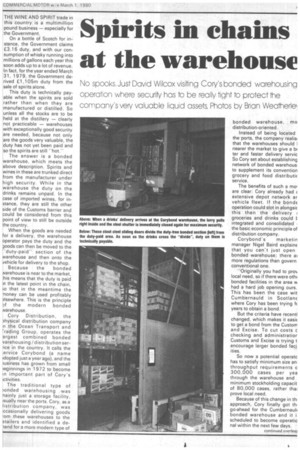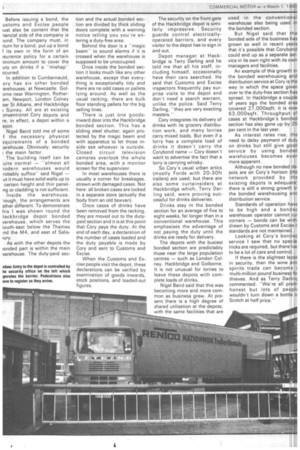Spirits hi chains at the warehouse
Page 47

Page 48

If you've noticed an error in this article please click here to report it so we can fix it.
No spooks Just David Wilcox visiting Cory's bonded warehousing operation where securi-y has to oe really tight to protect company's very valuable licuic assets, Photos by Brian Wea erle
THE WINE AND SPIRIT trade in this country is a multimillion pound business — especially for the Government.
On a bottle of Scotch for in-: stance, the Government claims £3.16 duty, and with our consumption of whisky running into millions of gallons each year this soon adds up to a lot of revenue. In fact, for the year ended March 31, 1979, the Government derived £1,105m duty from the sale of spirits alone.
This duty is technically payable when the spirits are sold rather than when they are manufactured or distilled. So unless all the stocks are to be held at the distillery — clearly not practicable — warehouses with exceptionally good security are needed, because not only are the goods very valuable, the duty has not yet been paid and so the spirits are still "hot."
The answer is a bonded warehouse, which meets the above description. Spirits and wines in these are trunked direct from the manufacturer under high security. While in th,e warehouse the duty on the drinks remains unpaid. In the case of imported wines, for instance, they are still the other side of the Customs barrier and could be considered from this point of view to still be outside the country.
When the goods are needed for a delivery, the warehouse operator pays the duty and the oods can then be moved to the "duty-paid" section of the warehouse and then onto the vehicle for delivery to the shop.
Because the bonded Narehouse is near to the market, his means that the duty is paid )t the latest point in the chain, ;o that in the meantime the -noney can be used profitably _elsewhere. This is the principle f the modern bonded Na rehouse.
Cory Distribution, the )hysical distribution company n the Ocean Transport and -rading Group, operates the argest combined bonded yarehousing /distribution serrice in the country. It calls the .ervice Corybond (a name idopted just a year ago), and the )usiness has grown from small )eginnings in 1972 to become in important part of Cory's
The traditional type of )onded warehousing was nainly just a storage facility, isually near the ports. Cory, as a listribution company, was Iccasionally delivering goods -om these warehouses to the etailers and identified a deland for a more modern type of bonded warehouse, mo distribution-oriented.
Instead of being located the ports, the company reel's that the warehouses should I nearer the market to give a bi ter and faster delivery servic So Cory set about establishing network of bonded warehous. to supplement its convention grocery and food distributic service.
The benefits of such a mo, are clear: Cory already had extensive depot network ar vehicle fleet. If the bondE operation could slot in alongsic this then the delivery groceries and drinks could k integrated and consolidated the basic economic principle of distribution company.
Corybond's marketin manager Nigel Baird explaine that you can't just open bonded warehouse; there ai more regulations than govern conventional one.
"Originally you had to pro‘. local need, so if there were othi bonded facilities in the area had a hard job opening ours. This has been the case wit Cumbernauld in Scotlanc where Cory has been trying ft years to obtain a bond.
But the criteria have recentl changed, which makes it easiE to get a bond from the Custom and Excise. To cut costs c checking and administratior Customs and Excise is trying t encourage larger bonded faci ities.
So now a potential operatc has to satisfy minimum size an throughput requirements c 300,000 cases per yea through the warehouse and minimum stockholding capacit of 80,000 cases, rather thai prove local need.
Because of this change in th, approach, Cory finally got th go-ahead for the Cumbernauli bonded warehouse and it i scheduled to become operatic nal within the next few days.
Before issuing a bond, the ustoms and Excise people lust also be content that the rhancial side of the company is )und. The company must, in turn for a bond, put up a bond F its own in the form of an isurance policy for a certain iinimum amount to cover the uty on drinks if a "mishap" ccurred.
In addition to Cumbernauld,. ory has six other bonded arehouses, at Newcastle, GolDrne near Warrington, Rotherpm, Newport, London Colney par St Albans, arid Hackbridge Surrey. All are at existing Dnventional Cory depots and re, in effect, a depot within a epot.
Nigel Baird told me of some f the necessary physical aquirements of a bonded iarehouse. Obviously, security ; the main factor.
The building itself can be uite normal — "almost all lodern warehouses would robably suffice" said Nigel — ut it must have solid walls up to certain height and thin panelng or cladding is not sufficient. Inside the warehouse, hough, the arrangements are ather different. To demonstrate his I was shown round the lackbridge depot bonded warehouse, which serves the ;outh-east below the Thames Ind the M4, and east of Sailsairy.
As with the other depots the ionded part is within the main varehouse. The duty-paid sec tion and the actual bonded section are divided by thick sliding doors complete with a warning notice telling you you're entering a duty-free area.
Behind the door is a "magic beam" to sound alarms if it is crossed when the warehouse is supposed to be unoccupied.
Once inside the bonded section it looks much like any other warehouse, except that everything is exceptionally tidy and there are no odd cases or pallets lying around. As well as the usual racking, there are bulk floor standing pallets for the big selling lines.
There is just one goodsinward door into the Hackbridge bonded section. This has a sliding steel shutter, again protected by the magic beam and with apparatus to let those inside see whoever is outside. Closed circuit television cameras overlook the whole bonded area, with a monitor screen for the supervisor.
In most warehouses there is usually a corner for breakages, strewn with damaged cases. Not here: all broken cases are locked in a separate store (actually the body from an old boxvan).
Once cases of drinks have been removed from the racking, they are moved out to the dutypaid section and it is at this point that Cory pays the duty. At the end of each day, a declaration of the number of cases loaded and. the duty payable is made by Cory and sent to Customs and Excise.
When the Customs and Excise people visit the depot, these declarations can be verified by examination of goods inwards, stock positions, and loaded-out figures. The security on the front gate of the Hackbridge depot is similarly impressive. Security guards control electricallyoperated barriers, and every visitor to the depot has to sign in and out.
Depot manager at Hackbridge is Terry Darling and he told me that all his staff, including himself, occasionally have their cars searched. He said that Customs and Excise inspectors frequently pay surprise visits to the depot and don't need a search warrant, unlike the police. Said Terry Darling, "they are very exacting masters."
Cory integrates its delivery of drinks with its grocery distribution work, and many lorries carry mixed loads. But even if a lorry has a complete load of drinks it doesn't carry the Corybond name — Cory doesn't want to advertise the fact that a lorry is carrying whisky.
So Cory's usual urban artics (mostly Fords with 20-30ft trailers) are used; but there are also some curtainsiders at Hackbridge which, Terry Darling said, were proving successful for drinks deliveries.
Drinks stay in the bonded section for an average of five to eight weeks, far longer than in a conventional warehouse. This emphasises the advantage of not paying the duty until the drinks are ready for delivery.
The depots with the busiest bonded section are predictably those near the large population centres — such as London Colney, Hackbridge and Golborne. It is not unusual for lorries to leave these depots with complete.loads of drinks.
Nigel Baird said that this was becoming more and more common .as business grew. At present there is a high degree of shared utilisation at the depots. with the same facilities that are used in the conventional warehouse also being used in the bonded section.
But Nigel said that the bonded side of the business has grown so well in recent years that it's possible that Corybond could end up as a separate service in its own right with its own managers and facilities.
An example of this growth in the bonded warehousing and distribution service at Cory is the way in which the space given over to the duty-free section has spread. In Hackbridge a couple of years ago the bonded area covered 27,000sqft; it is nor, 63,000sqft. Throughput of cases at Hackbridge's bonded section has also gone up by 25 per cent in the last year.
As interest rates rise, the need to delay payment of duty on drinks but still give good service by using bonded warehouses becomes even more apparent.
Although no new bonded depots are on Cory's horizon (the network provided by the existing depots is adequate', there is still a strong growth ir the bonded warehousing aric distribution service.
Standards of operation havE to be high and a bondec warehouse operator cannot cu corners — bonds can be with drawn by Customs and Exciselstandards are not maintained.
Looking at Cory's bondec service I saw that no specia tricks are required, but there hat to be a lot of care and control.
If there is the slightest lapsE in security, then the wine anc spirits trade can become multi-million pound business fo thieves. And as Terry Darlinc commented: "We're all prett! honest but lots of peopii wouldn't turn down a bottle o Scotch at half price."
















































































































